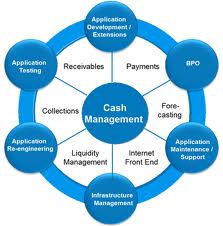Cash management
Cash management refers to a broad area of finance involving the collection, handling, and usage of cash. It involves assessing market liquidity, cash flow, and investments.
In banking in the United States, cash management, or treasury management, is a marketing term for certain services related to cash flow offered primarily to larger business customers. It may be used to describe all bank accounts (such as checking accounts) provided to businesses of a certain size, but it is more often used to describe specific services such as cash concentration, zero balance accounting, and automated clearing house facilities. Sometimes, private banking customers are given cash management services.
Cash budget:
Do you forecast your cash needs for single period or multiple periods (for months & weeks simultaneously)?
Do you use distribution- starting with data on relatively long period and breaking it down into relatively smaller periods, or scheduling- starting with data on relatively short periods and aggregating into longer periods?
The approach used for cash forecast-
i) Receipts & Disbursement approach
ii) Adjusted net income approach.
Items to be forecasted-
Some possible types of cash receipts
- Accounts receivable collections-domestic customers
- Accounts receivable collections-foreign customers
- Notes receivable
- Rental income
- Interest income
- Principle on Maturing investment
- Dividends from subsidiaries
Miscellaneous Receipts
- Some possible types of cash disbursements
- Cash purchase Materials
- Payroll-Executive
- Payroll-Nonexecutive
- Taxes-Local
- Taxes-State
- Maturing Accounts payable
- Mortgage Payments
- Maturing Notes Payable-Interest and Principal
- Capital Expenditures
- Utility Payments
- Dividends-Preferred Stock
- Dividends Common Stock
- Sinking Fund Payments-Outstanding Bonds
- Interest Payment-Outstanding Bonds
- Maturing Bonds-Principal Repayments
- Payments to Pension Fund
- Market Repurchase of outstanding Stock or Bonds
Miscellaneous Disbursements
Any other receipts/ disbursements forecasted
Sales uncertainty
Collection rate uncertainty
Production cost uncertainty
Capital outflow uncertainty
Any other types of uncertainties
Do you use any customized software for making these forecasts?
Do you consider uncertainties regarding cash forecast-
What are the acceptable levels of errors regarding these?
Do you use sensitivity or simulation analysis for measuring uncertainties?
Balance Policy:
Does the firm hold extra cash, what is the approximate range?
Does the firm maintain excess cash reserve for facing sales seasonality, factors considered for this purpose?
Does the form maintain a reserve credit line with a bank or group of banks?
Does the firm use futures contract? If yes, then which of the followings-
Interest rate futures
Foreign exchange futures
Commodity futures
Does the firm have to meet margin requirement for this purpose?
Does the firm use options contracts? If yes, then which types of options?
Investment policy:
Whether the firm invests in near cash assets, what are those assets?
Fixed cost components of the transaction cost of cash equivalents.
Cash reserve maintained for bearing these fixed costs.
Whether the firm invests in marketable securities when it has excess cash.
Amount of investment in the securities by category.
Bank Loan:
1. Does the firm uses short term bank loans for financing its production costs or disbursements?
2. Does the firm use Lie of Credit?
3. With which banks the firm has such arrangements?
4. What is the possible credit limit of the firm?
















